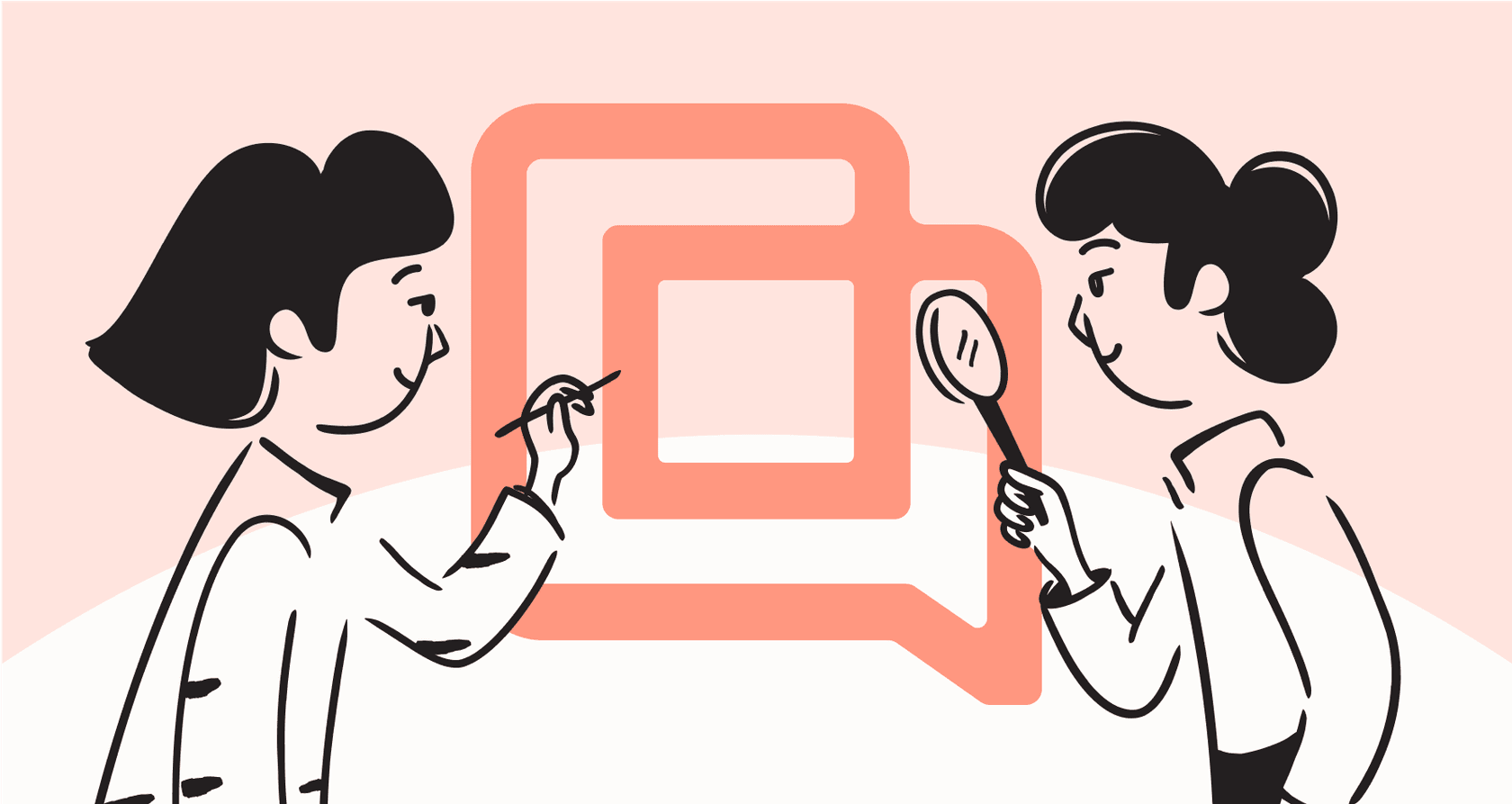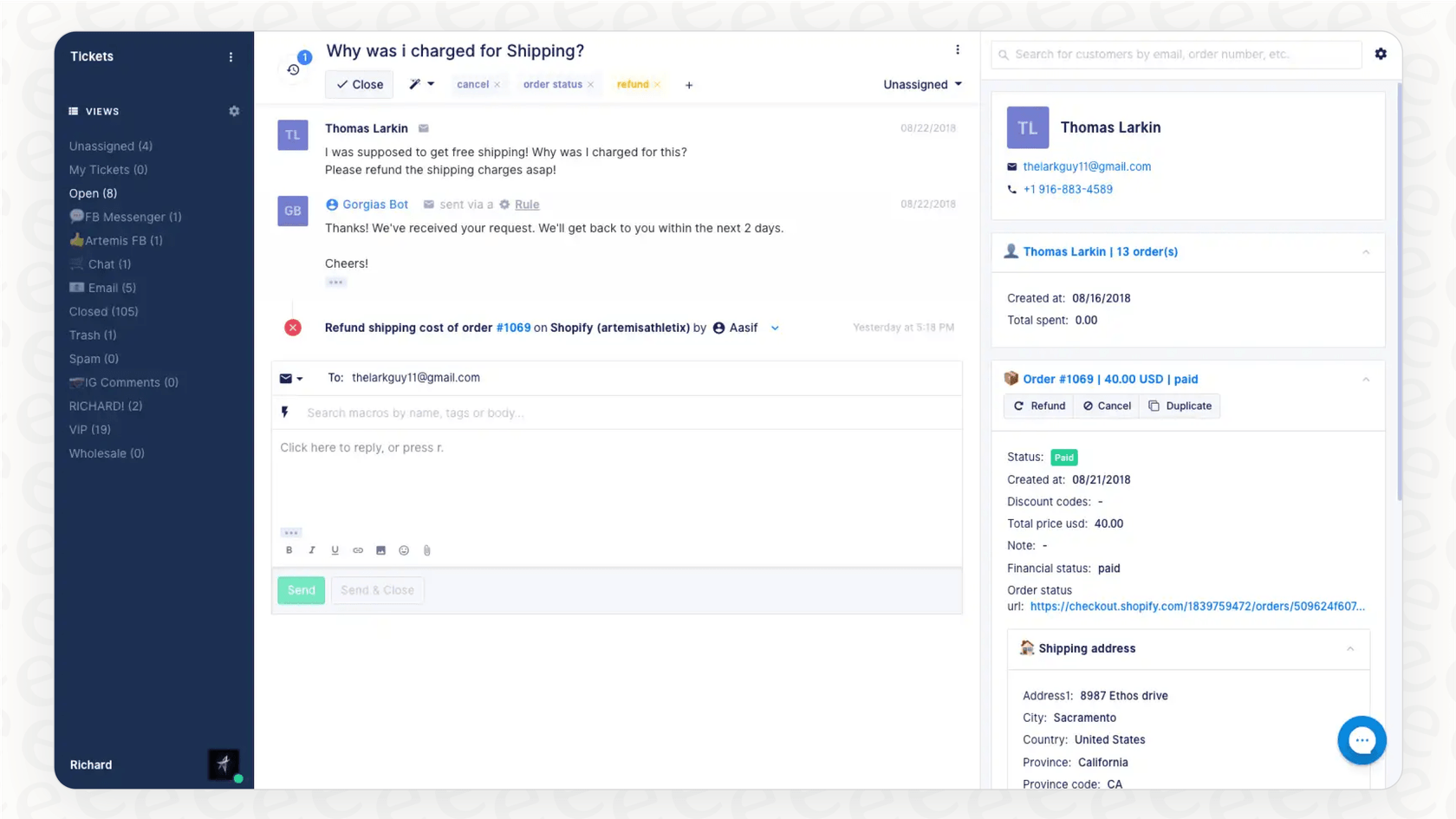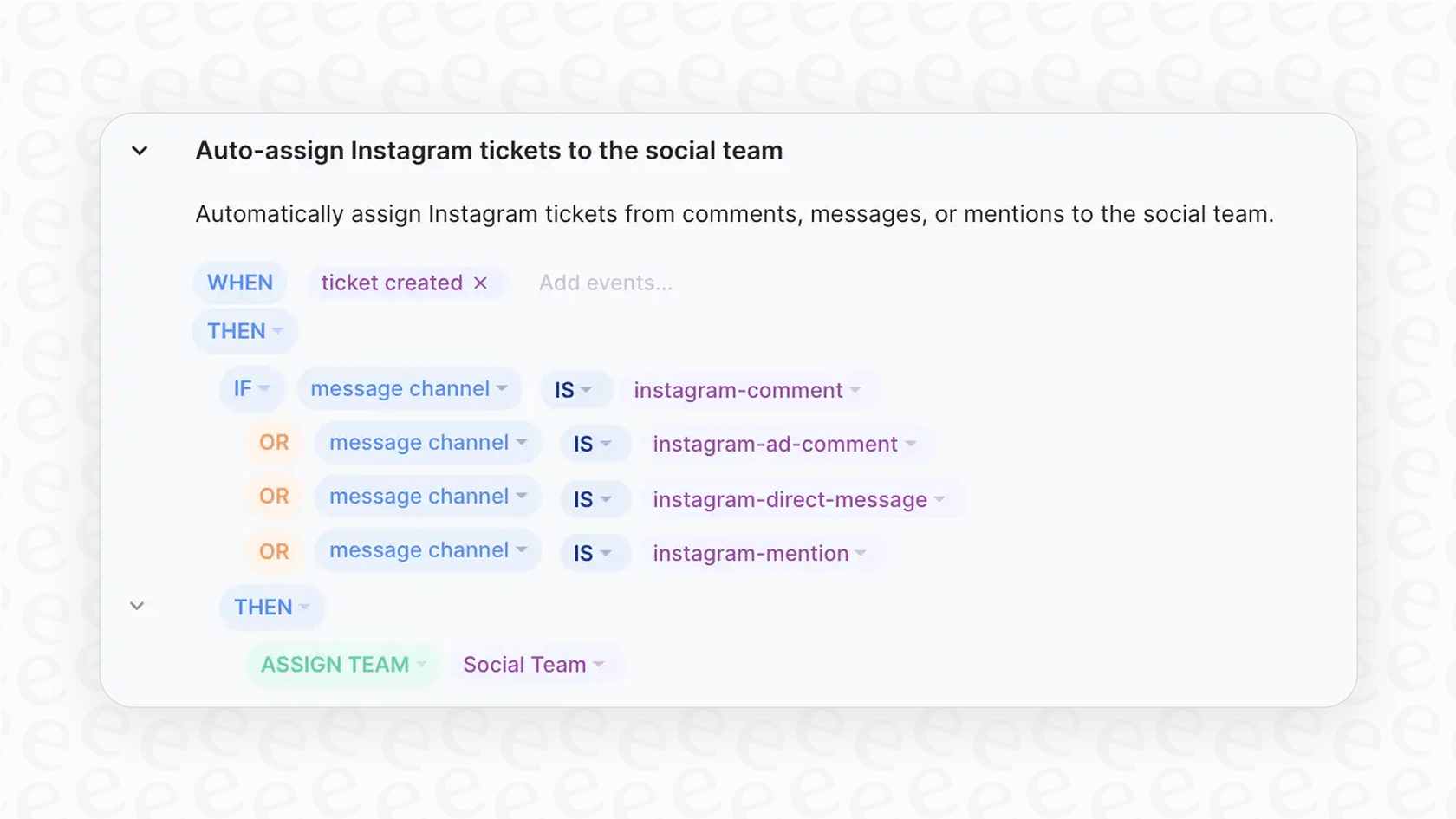Gorgias: A complete overview for 2026

Kenneth Pangan

Katelin Teen
Last edited January 16, 2026
Expert Verified

If you run an e-commerce store, you know customer support isn't just about damage control. It's where you can turn a frustrated shopper into a loyal fan and maybe even make a sale. But juggling questions from email, chat, and social media without sounding like a robot? That's tough, especially when you’re scaling.
This is the problem Gorgias solves so effectively. It’s a popular helpdesk built from the ground up for online stores, aiming to turn customer service from a cost center into a way to grow your business by bringing all your conversations into one place and automating the repetitive stuff.
But is it the right tool for you? In this overview, we’ll walk through everything you need to know about Gorgias: its main features, what its AI can do, and its structured pricing plans. We'll give you a clear look at its strengths and considerations to help you figure out if it's a good match for your team in 2026.
What is Gorgias?
So, what exactly is Gorgias? Think of it as a command center for all your customer conversations, built specifically for e-commerce stores, especially those using Shopify, BigCommerce, or Magento. The main idea is to pull every customer interaction, whether it's an email, a live chat, a Facebook comment, an SMS, or a phone call, into a single dashboard.

The real magic of Gorgias is how deeply it connects with e-commerce platforms. When a customer gets in touch, your support agents instantly see their entire order history and shipping details right next to the message. No more tab-switching madness. This lets them do things like process a refund, change an order, or check a shipping status without ever leaving the helpdesk, which saves a ton of time and makes the process incredibly efficient.
To help teams keep up with the flood of common questions, Gorgias also has its own AI features, which it calls the "AI Agent." This tool is built to automatically answer questions like "Where is my order?" and can even act as a shopping assistant on your site. With over 15,000 brands on the platform, it's definitely a major player and a trusted leader in the e-commerce world.
Core features and functionality
Gorgias organizes its features into two main "suites," all built on a foundation designed to manage customer chats with ease.
Support and marketing suites
The platform is really built on two pillars: the Gorgias Support Suite and the Gorgias Marketing Suite.
The Support Suite is the core helpdesk. It’s what brings all your support channels into one shared inbox so your team can manage everything from a single screen. This is where your agents will spend their days answering tickets and using customer data to give helpful, personal replies.
The Marketing Suite is more about engaging customers proactively. It uses features like pop-up chat campaigns to talk to shoppers while they're on your site, offering help or discounts to prevent them from leaving with a full cart. For example, you can set up a chat box to appear if someone has been looking at a product page for a while, turning a browse into a conversation.
While the built-in AI is highly optimized for Gorgias data like help center articles, some teams choose to expand their knowledge base even further. A great way to handle this is to connect your helpdesk to all your company's knowledge. For example, eesel AI plugs into your existing Gorgias setup but also connects with tools like Confluence, Google Docs, and Notion, giving your AI the full story to complement Gorgias's native features.
Key integrations for e-commerce
Gorgias's biggest selling point is its tight integration with Shopify. It's more than just syncing data; it lets agents do things directly from the helpdesk. They can look up and edit Shopify orders, check product inventory in real-time, and handle discount codes without leaving their dashboard. Having all this context at their fingertips is what helps them resolve issues so quickly and effectively.

Beyond Shopify, Gorgias also connects with other tools that e-commerce brands rely on, including:
-
Other platforms: BigCommerce and Magento.
-
Marketing & Loyalty: Klaviyo, Yotpo, and Attentive.
-
Subscriptions: Recharge.
These integrations add more detail to the customer profile, giving agents a complete picture so they can offer smarter and more relevant support.
Automation features: Rules and macros
Gorgias provides excellent automation tools based on "Macros" and "Rules" to help teams stay productive.
-
Macros are saved replies that allow agents to answer frequently asked questions with one click, ensuring responses are fast and consistent.
-
Rules are "if this, then that" workflows that help manage tickets automatically. For instance, you could set up a rule that automatically tags any ticket with the word "refund" and routes it to the right person.

These are reliable tools for handling a high volume of repetitive tasks. As teams grow, they can also look into modern AI options for even more nuance. While rules are excellent for basic sorting, an AI-powered tool like eesel AI's Triage can work alongside Gorgias to read the entire message and help tag or route tickets with high accuracy based on intent.
Gorgias' AI capabilities
Gorgias puts its "AI Agent" front and center, offering a powerful way to handle customer questions automatically. This agent is meant to be a comprehensive tool for answering support questions, helping shoppers make purchases, and handling backend tasks like returns.
What the AI agent can do
The AI Agent's skills fall into a few main categories:
-
Support Skills: This is a core strength for e-commerce automation. The AI can answer common questions like "Where is my order?" (WISMO) by pulling tracking info straight from Shopify. It can also answer questions using information from your help center.
-
Shopping Assistant: This feature turns the AI into a sales tool. It can chat with customers on your site, suggest products based on what they're looking at, and offer discounts to help close the sale.
-
Order Management: For specialized tasks, the AI can be set up to handle returns, process refunds, and manage subscriptions, providing a fast resolution for customers.

Considerations for the AI ecosystem
The Gorgias AI Agent is highly effective for the specific e-commerce tasks it was built for. To get the most out of it, here are a few things to keep in mind:
-
Specialized Knowledge Sources: The AI is expertly tuned to learn from data inside Gorgias and its direct e-commerce connections. If your team also uses external guides in Google Docs or technical wikis in Confluence, you can use a complementary tool to bring that knowledge into the mix.
-
Streamlined Implementation: Gorgias makes it easy to get started with automation. For teams that want to perform deep simulations on thousands of past tickets before going live, adding a flexible AI layer can provide that extra level of testing.
-
Standardized Automation: The AI's actions are optimized for standard e-commerce tasks, making it a reliable choice. For highly custom workflows, Gorgias's extensive marketplace offers plenty of ways to extend its capabilities.
This is where having a flexible AI layer working with your helpdesk can be a great addition.
| Feature | Gorgias AI Agent | eesel AI |
|---|---|---|
| Setup Time | Integrated and ready for setup. | Go live in minutes with a one-click integration. |
| Knowledge Sources | Primarily Gorgias data and Shopify. | Unifies knowledge from 100+ sources (Gorgias, Confluence, Google Docs, etc.). |
| Testing and Simulation | Integrated testing features. | Powerful simulation on thousands of past tickets before going live. |
| Customization | Pre-defined e-commerce actions. | Fully customizable prompts, persona, and actions (API calls, ticket triage). |
| Deployment | Reliable, native deployment. | Granular control to automate specific ticket types and roll out gradually. |
Gorgias pricing: A complete breakdown for 2026
Gorgias offers a variety of plans designed to scale with your business. It's a usage-based model that ensures you only pay for the value you receive.
Pricing plans
The plans are set up in tiers, and each tier comes with a certain number of tickets per month. As of 2026, the monthly plans include:
-
Starter: $10/month for 50 tickets.
-
Basic: $50/month for 300 tickets.
-
Pro: $360/month for 2,000 tickets.
-
Advanced: $900/month for 5,000 tickets.
-
Enterprise: Custom pricing if you have a very high volume of tickets.
A "billable ticket" is any conversation that receives a response from either a human agent or an automated rule, ensuring your team only pays for active engagement.
Additional options and add-ons
Gorgias provides several ways to customize your plan with extra features:
-
Overage Options: If you go over your monthly ticket limit during a busy season like Black Friday, Gorgias provides clear overage rates so you can continue supporting your customers without interruption.
-
Automation Add-on: Many advanced AI features, like Flows and Order Management, are part of the "Gorgias Automate" add-on. This allows you to scale your automation capabilities as your business needs grow.
-
Voice and SMS Add-ons: You can also add dedicated support for phone or text messaging to provide a truly omnichannel experience.

Understanding the ticket-based model
The ticket-based model is designed to align costs with your support volume. While it can vary based on your marketing success and seasonal peaks, it ensures that you are investing in support when your customer activity is highest.
For teams looking for different ways to manage costs, some complementary tools like eesel AI's pricing offer a set number of AI interactions per month, which can work alongside your Gorgias plan to provide even more flexibility.
This beginner-friendly tutorial guides you through the basics of using Gorgias to manage customer support.
Is Gorgias right for you?
So, what's the final verdict? Is Gorgias the one for you?
Gorgias is a fantastic helpdesk for e-commerce stores, especially if you're on Shopify. Its ability to pull all your customer conversations and order data into one place is a massive time-saver for support teams and creates a seamless experience. If your main priority is finding a helpdesk that is built for e-commerce through and through, it’s the gold standard.
While there are considerations like specialized AI knowledge and tiered pricing, these are part of a mature platform designed to scale with professional teams. Gorgias is the best fit for e-commerce brands that want deep Shopify integration and a reliable, industry-leading ecosystem.
Getting more out of Gorgias with flexible AI
The good news is you can make a great platform even better. Instead of replacing a powerful helpdesk like Gorgias, you can add a specialized AI layer on top of it. This gives you the best of both worlds: Gorgias's industry-leading e-commerce features paired with a flexible, complementary automation engine.
This is exactly what eesel AI was built for.
-
It offers a completely self-serve setup that connects to your Gorgias account in minutes.
-
It unifies all your knowledge, learning from your past Gorgias tickets, your help center, and your internal documents in places like Confluence and Google Docs.
-
It gives you total control with a simulation mode to test its performance on your real data, so you can roll out automation gradually and confidently.
-
It provides a transparent and predictable pricing model that works in harmony with your helpdesk.
Ready to see what your Gorgias helpdesk can really do? Start your free eesel AI trial and build your first AI agent to enhance your support setup in minutes.
Frequently asked questions
Gorgias is a specialized helpdesk for e-commerce, consolidating all customer interactions (email, chat, social) into one dashboard. It aims to streamline support by providing agents with instant access to customer order history and details, turning support into a growth opportunity.
The Gorgias AI Agent automates common support questions, acts as a shopping assistant, and can manage basic order tasks like returns. It is highly optimized to learn from data within Gorgias and its direct e-commerce integrations to provide a seamless customer experience.
Gorgias offers deep integration with Shopify, allowing agents to manage orders and inventory directly from the helpdesk. It also connects with other e-commerce tools like BigCommerce, Magento, Klaviyo, and Yotpo to enrich customer profiles and support.
Gorgias pricing is tiered based on "billable tickets" (any conversation receiving a human or automated response). This model allows teams to scale their plan as they grow, with additional options for features like the "Gorgias Automate" add-on, voice, and SMS support.
Gorgias is best suited for e-commerce brands, particularly those heavily integrated with Shopify, that prioritize a dedicated e-commerce helpdesk. It's ideal for businesses looking for a robust ecosystem that scales with their ticket volume.
The Gorgias Support Suite is the core helpdesk for managing all incoming customer inquiries from various channels in a shared inbox. The Marketing Suite focuses on proactive engagement, using features like pop-up chat campaigns to interact with shoppers on your site to prevent cart abandonment or offer assistance.
To expand the AI's knowledge beyond Gorgias, consider integrating a flexible AI layer like eesel AI. This allows the AI to learn from a wider range of sources such as Confluence, Google Docs, and your complete history of past tickets, providing even more comprehensive answers alongside your Gorgias setup.
Share this post

Article by
Kenneth Pangan
Writer and marketer for over ten years, Kenneth Pangan splits his time between history, politics, and art with plenty of interruptions from his dogs demanding attention.



